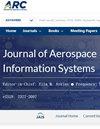Anomaly Detection for Agile Satellite Attitude Control System Using Hybrid Deep-Learning Technique
IF 1.5
4区 工程技术
Q2 ENGINEERING, AEROSPACE
引用次数: 1
Abstract
Agile low-Earth-orbit (LEO) observation satellites need a robust attitude control and determination system. It is a critical satellite subsystem, which stabilizes the satellite to different desired orientations during its mission using different actuators. The detection of satellite misorientation is a highly challenging problem because it requires continuous monitoring of data from hundreds of satellite sensors to guarantee healthy operability. In this paper, the authors propose a data-driven deep-learning framework for detecting satellite misorientation by analyzing attitude control subsystem telemetry data. The proposed approach combines a hybrid predictive deep-learning model that consists of long short-term memory and convolutional neural networks in two parallel paths to predict telemetry data and a robust isolation forest classifier for anomaly detection purposes that can classify output residuals as normal or anomalous. The hybrid model was optimized by the particle swarm optimization algorithm to ensure faster fitness function convergence with optimal model hyperparameters. The suggested data-driven model was validated using real telemetry datasets, including real anomalous case studies. The experimental results proved the suggested approach’s superiority for identifying satellite misorientation as well as helping satellite operators monitor the system’s health and deduce the causes of anomalies to aid in decision-making.基于混合深度学习技术的敏捷卫星姿态控制系统异常检测
敏捷近地轨道观测卫星需要一个鲁棒的姿态控制和确定系统。它是一个关键的卫星分系统,在卫星执行任务时使用不同的作动器将卫星稳定在不同的期望方向上。卫星定向错误的检测是一个极具挑战性的问题,因为它需要持续监测来自数百个卫星传感器的数据,以保证正常的可操作性。在本文中,作者提出了一个数据驱动的深度学习框架,通过分析姿态控制子系统的遥测数据来检测卫星的定向错误。提出的方法结合了混合预测深度学习模型,该模型由长短期记忆和卷积神经网络组成,在两条并行路径上预测遥测数据,以及用于异常检测目的的鲁棒隔离森林分类器,该分类器可以将输出残差分类为正常或异常。采用粒子群优化算法对混合模型进行优化,使适应度函数更快收敛到最优模型超参数。建议的数据驱动模型使用真实的遥测数据集进行验证,包括真实的异常案例研究。实验结果证明了该方法在识别卫星定向错误以及帮助卫星运营商监测系统健康状况和推断异常原因以辅助决策方面的优越性。
本文章由计算机程序翻译,如有差异,请以英文原文为准。
求助全文
约1分钟内获得全文
求助全文
来源期刊

Journal of Aerospace Information Systems
ENGINEERING, AEROSPACE-
CiteScore
3.70
自引率
13.30%
发文量
58
审稿时长
>12 weeks
期刊介绍:
This Journal is devoted to the dissemination of original archival research papers describing new theoretical developments, novel applications, and case studies regarding advances in aerospace computing, information, and networks and communication systems that address aerospace-specific issues. Issues related to signal processing, electromagnetics, antenna theory, and the basic networking hardware transmission technologies of a network are not within the scope of this journal. Topics include aerospace systems and software engineering; verification and validation of embedded systems; the field known as ‘big data,’ data analytics, machine learning, and knowledge management for aerospace systems; human-automation interaction and systems health management for aerospace systems. Applications of autonomous systems, systems engineering principles, and safety and mission assurance are of particular interest. The Journal also features Technical Notes that discuss particular technical innovations or applications in the topics described above. Papers are also sought that rigorously review the results of recent research developments. In addition to original research papers and reviews, the journal publishes articles that review books, conferences, social media, and new educational modes applicable to the scope of the Journal.
 求助内容:
求助内容: 应助结果提醒方式:
应助结果提醒方式:


